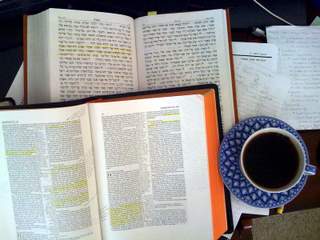|
Classical Literature from a Christian
Worldview
I
could expound on the importance of a classical education, my course
for the fall of 2002. Aside
from learning how to learn, from proper hermeneutics and instruction
in the grammatical-historical method of interpretation, and the
biblical languages: what more could we ask but to learn of the
contemporary cultures? If, as Northrup
Frye says, "It [the Bible] should be taught so early and
so thoroughly that it sinks straight to the bottom of the mind,
where everything that comes along later can settle on it,” then
I am obligated to make the Scriptures come alive to my students
in all ways possible.
This class studies the changes the Hebrews and the
Christians brought about in the known world, replacing barbarism with a
civilization that held each human life to be sacred, a concept without
precedence in the Oriental or pagan world.
The providential hand of God is seen in studies that range from
Alexander the Great’s popularization of Greek as a
common world language, translating neo-platonic and Hebrew texts into Greek at
Alexandria, to the very architectural monuments built to glorify pagan Roman
patriotism,
which would now prove useful to the travelling
apostles of Christ. All events in world history as seen as
preparatory for the birth of the Christ.
The Roman State, with its absence of any
moral virtues, would self-destruct through internal corruption. Tertullian would
cry out against the Platonic poison, “What
really does Jerusalem to do with Athens?” We discuss whether it is
even edifying to study and quote the non-Christian classical authors.
The heroic Job shines next to the pouting Achilles
of Homer’s epics, The Iliad and The Odyssey. The gods of Ate are nothing in comparison to
the God of Abraham, the God of compassion.
An introduction to Socrates is a pre-introduction to the church
fathers. Mythology in the form of
Trojan-Cycle Greek tragedy opens all of the classical allusions in the Book of
Acts, and the form of the book itself, to a deeper understanding. Ending with the Fall of Rome and Augustine’s Confessions, the class learns the impact of the Hebrews with their concept of
One God and the Christians who turned their world ‘upside down.’
|

